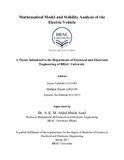Mathematical model and stability analysis of electric vehicle
Abstract
Light electric vehicles such as Tuk-Tuk, human haulers, and commuter bikes are
gradually becoming a popular form of transportation in the cities as well rural areas
of Bangladesh. A significant number of people of Bangladesh are directly or
indirectly dependent upon this rickshaw-van pulling profession. This paper
describes a research to modernize the pollution free rickshaw-van, aiming to
improve the lifestyle and income of the rickshaw-pullers and reduce stress on the
health of the pullers. The modernized rickshaw-van used in our experiment causes
no carbon emission and thus it is eco-friendly. The electrically assisted rickshawvan
consists of torque sensor pedal in order to reduce the overuse of battery-bank.
The control system assists the human power with motor and saves energy by
reducing the overuse of motor. PV panel is installed on the rooftop of van to share
the load power and a solar battery charging station is implemented to make the
whole system completely independent of national grid. The paper describes the
data obtained from field test to determine its performance, feasibility and user
friendliness. The solar battery charging station is designed and its performance
analysis is included as well. The hybrid “green” rickshaw-van was developed to
save energy, use sufficient solar energy and make it a complete off grid solution.
The thesis projects the theoretical functionality of the electric vehicles developed
by CARC (Control & Applications Research Centre) through the development of
mathematical model and henceforth the stability analysis which will help to ensure
the reliability and ride comfort in the vehicles.

